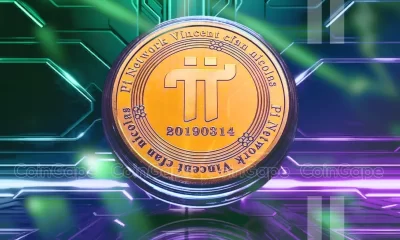Opinion
Silent Payments Are Coming To Better Protect Bitcoin Users
Published
4 months agoon
By
admin

Bitcoin continues to provide a massive breakthrough in the digital age by allowing people to transact between each other without third parties. Bitcoin Magazine covered Silent Payments over two years ago to shed light on one of Bitcoin’s shortcomings: privacy. It was a problem then and it still is today…as stated:
“…a push based payment system (no one is allowed to “pull” payments from you, you have to explicitly authorize them yourself and “push” them to other people), Bitcoin requires the sender to have the information necessary to define the destination for money they send. This requires the recipient communicating to the sender their Bitcoin address in one way or another. In the case of trying to raise money from the general public, this has massive consequences in terms of privacy or needing to maintain a constant interactive presence online. Anyone is totally capable of simply posting a single Bitcoin address somewhere online, and from that point, anyone who wishes to send money to that person can simply do so, but there is no privacy in raising money in this way. Simply take that address and look it up on the blockchain, and you cannot only see how much money that person has been sent, but you can see the footprint on the blockchain of everyone who has sent them money. Both the person attempting to raise funds and everyone who has donated to them have no privacy whatsoever; everything is completely open and correlated for the whole world to see.”
Before Silent Payments, the only alternative was to reuse addresses on a per-contact basis to protect your privacy, or to run a server that offers a new address every time someone requests to send you money. Neither of which are usable or scalable option for most users, reserving privacy for a privileged few who knew how to achieve privacy. Fortunately, the community has made massive progress since then, with the release of Silent Payments.
BIP352 (Silent Payments)
After much discussion on how to implement the feature as efficiently as possible, BIP352 is now a reality. When someone wants to receive money privately, lets say an activist organization, they can post their Silent Payments address on their site instead of a traditional Bitcoin address. Now, when a user wants to send the organization money, they use a Silent Payment address within a supporting wallet. This will automatically use the unique public key attached to the Silent Payment address, combined with the public keys of the outputs they want to send to generate a brand new, single-use address that looks like any other Bitcoin address. It sounds complicated, but all of this functions behind the scenes. All a user needs to do is paste the address and send money to it, just like any other address. There are many benefits:
1) The organization itself only has to post a single address on its site to still receive the benefit of generating new addresses for every transaction.
2) The user sending money to the organization can always reference the same static address, making it easy for them to continually send money without needing to track multiple addresses.
3) If the same user continually gives money to the same Silent Payments address, a new Bitcoin address is generated each time, so the sender doesn’t need to worry about the receiver knowing it’s the same user sending them money.
4) The receiver gains massive privacy benefits as users are not able to easily look into the funds of their wallet and see who else is sending them money.
5) The addresses that are generated to transact between both users appear like any other Bitcoin transaction, meaning use of the feature is obfuscated to outside parties.
6) No server is required. Any wallet that supports Silent Payments handles all this technology locally within the wallet.
To summarize the benefits: With Silent Payments, any person or organization can now opt to using a static Silent Payments Bitcoin address in place of their traditional static address to not only have better privacy for themselves, but it also protects people trying to send them money by ensuring not even they as receivers can snag information about senders. With Silent Payments, the sender and receiver gain a massive layer of privacy, while still largely benefiting from the power of the underlying Bitcoin protocol to give them the freedom to transact as they please.
With that said, there are drawbacks. The first is a direct result of the benefit of not needing a dedicated device online to facilitate the transactions. Users will need to scan through blockchain transactions to detect payments made to them. This scanning can take time, but it comes with massive privacy benefits for both users. Over time, performance of scanning can also be improved to make this less of an issue for users.
The second issue is one of adoptability, since Silent Payments are new with wallet support being fairly limited at the time of writing. Both the sender and receiver need to use a wallet that offers support for the feature. silentpayments.xyz is a resource that shares which wallets support Silent Payments, the first of which
to currently have full support being Cake Wallet. If the community hopes to see wider adoption of Silent Payments, wallets need to integrate the functionality to offer more users the privacy benefits provided by Bitcoin Silent Payments.
Overall the idea of protecting user privacy through the native Bitcoin protocol is an important one that can offer user privacy without jeopardizing what makes Bitcoin, Bitcoin. In fact, the privacy benefits of Silent Payments strengthen the fundamental beliefs of the Bitcoin community by offering users the freedom to transact with better privacy if they choose to.
This is a guest post by Henry Fisher. Opinions expressed are entirely their own and do not necessarily reflect those of BTC Inc or Bitcoin Magazine.
Source link
You may like


BNB Steadies Above Support: Will Bullish Momentum Return?


Metaplanet makes largest Bitcoin bet, acquires nearly 620 BTC


Tron’s Justin Sun Offloads 50% ETH Holdings, Ethereum Price Crash Imminent?


Investors bet on this $0.0013 token destined to leave Cardano and Shiba Inu behind


End of Altcoin Season? Glassnode Co-Founders Warn Alts in Danger of Lagging Behind After Last Week’s Correction


Can Pi Network Price Triple Before 2024 Ends?



Recently, BlackRock released an educational video explaining Bitcoin, which I thought was great—it’s amazing to see Bitcoin being discussed on such a massive platform. But, of course, Bitcoin X (Twitter) had a meltdown over one specific line in the video: “There is no guarantee that Bitcoin’s 21 million supply cap will not be changed.”
HealthRnager from Natural News claimed, “Bitcoin has become far too centralized, and now the wrong people largely control its algorithms. They are TELLING you in advance what they plan to do.”
Now, let me be clear: this is total nonsense. The controversy is overhyped, and the idea that BlackRock would—or even could—change bitcoin’s supply is laughable. The statement in their video is technically true, but it’s just a legal disclaimer. It doesn’t mean BlackRock is plotting to inflate bitcoin’s supply. And even if they were, they don’t have the power to pull it off.
Bitcoin’s 21 million cap is fundamental—it’s not up for debate. The entire Bitcoin ecosystem—miners, developers, and nodes—operates on this core principle. Without it, Bitcoin wouldn’t be Bitcoin. And while BlackRock is a financial giant and holds over 500,000 Bitcoin for its ETF, its influence over Bitcoin is practically nonexistent.
Bitcoin is a proof-of-work (PoW) system, not a proof-of-stake (PoS) system. It doesn’t matter how much bitcoin BlackRock owns; economic nodes hold the real power.
Let’s play devil’s advocate for a second. Say BlackRock tries to propose a protocol change to increase bitcoin’s supply. What happens? The vast network of nodes would simply reject it. Bitcoin’s history proves this. Remember Roger Ver and the Bitcoin Cash fork? He had significant influence and holdings, yet his version of bitcoin became irrelevant because the majority of economic actors didn’t follow him.
If Bitcoin could be controlled by a single entity like BlackRock, it would’ve failed a long time ago. The U.S. government, with its endless money printer, could easily acquire 10% of the supply if that’s all it took to control Bitcoin. But that’s not how Bitcoin works. Its decentralized nature ensures no single entity—no matter how powerful—can dictate its terms.
So, stop worrying about BlackRock “changing” Bitcoin. Their influence has hard limits. Even if they tried to push developers to change the protocol, nodes would reject it. Bitcoin’s decentralization is its greatest strength, and no one—not BlackRock, not Michael Saylor—can change that.
This article is a Take. Opinions expressed are entirely the author’s and do not necessarily reflect those of BTC Inc or Bitcoin Magazine.
Source link
Opinion
It’s Time to Admit It – There Are Only 2.1 Quadrillion Bitcoins
Published
2 days agoon
December 21, 2024By
admin
If the above statement offends you, you might not have read the Bitcoin source code.

https://x.com/pete_rizzo_/
Of course, I’m sure you’ve heard that there are 21 million bitcoin – and this is true, the Bitcoin protocol allows for only “21 million bitcoin” to be created, yet these larger denominations can be subdivided into 100 million sub-units each.
Call them whatever you want, there are only 2.1 quadrillion monetary units in the protocol.
This dollars and cents differential has long been the subject of debate – in the time of Satoshi, Bitcoin’s creator, the dual conventions, Bitcoin having both a bulk denomination, and a smaller unit, was not much of a concern. There were questions about whether the software would work at all, and bitcoin were so worthless, selling them in bulk was the only rational option.
Rehashing this debate is BIP 21Q, a proposal to the Bitcoin users authored by John Carvalho, founder of Synonym, creator of the Pubky social media platform, and a tenured contributor whose work dates back to the days of the influential Bitcoin-assets collective.
In short, the BIP proposes that network actors – the various wallets and exchanges – change how Bitcoin denominations are displayed, with the smallest unit of the protocol renamed “bitcoins,” as opposed to “satoshis,” as they have been commonly called.
Here are the specifics of the BIP:
Redefinition of the Unit:
- Internally, the smallest indivisible unit remains unchanged.
- Historically, 1 BTC = 100,000,000 base units. Under this proposal, “1 bitcoin” equals that smallest unit.
- What was previously referred to as “1 BTC” now corresponds to 100 million bitcoins under the new definition.
Terminology:
- The informal terms “satoshi” or “sat” are deprecated.
- All references, interfaces, and documentation SHOULD refer to the base integer unit simply as “bitcoin.”
Display and Formatting:
- Applications SHOULD present values as whole integers without decimals.
- Example:
- Old display: 0.00010000 BTC
- New display: 10000 BTC (or ₿10000)
Unsurprisingly, the debate around the BIP has been hostile. For one, it’s not a technical BIP, though this is not a requirement of the BIP process. Suffice to say, it’s perhaps the most general BIP that has been proposed under the BIP process to date, as it mainly deals with market conventions and user onboarding logic, not any changes to the software rules.
However, I have to say, I find the proposal compelling. Nik Hoffman, our News Editor, does not, preferring to stick to the market affirmative.
Yet, I think the proposal raises relevant questions: why should new users be forced to compute their Bitcoin balances using only decimals? Surely this has the adverse side effect of making commerce difficult – it’s simply antithetical to how people think and act today.
Also, in terms of savings, at an $100,000 BTC price, it isn’t exactly compelling to think you could be spending a whole year earning 1 BTC, though that may be.
Indeed, there have been various debates for all kinds of units – mBTC, uBTC – that play around with the dollars and cents convention, but Carvalho here is wisely skipping to the end, preferring just to rip the band-aid off. $1 would buy 1,000 bitcoins under his proposal.
What’s to like here, and I argued this during a Lugano debate on the topic in 2023, is that it keeps both the larger BTC denomination and the smaller unit, now bitcoins. They are both important, and serve different functions.
My argument then was that having a larger denomination like BTC (100 million bitcoins) is important. If there was no “BTC unit,” the press and financial media would be faced to reckon that “1 bitcoin” is still worth less than 1 cent.
How much mainstream coverage and interest do we think there would be? I’d bet not very much.
In this way, BIP 21Q is a best-of-both-worlds approach.
The financial world, press, and media can continue championing the meteoric rise in value of “BTC,” while everyday users can get rid of decimals and complex calculations, trading the only real Bitcoin unit guaranteed to exist in perpetuity.
This article is a Take. Opinions expressed are entirely the author’s and do not necessarily reflect those of BTC Inc or Bitcoin Magazine.
Source link
Bitcoin spot ETF
We Need In-Kind Redemptions For The Spot Bitcoin ETFs
Published
2 days agoon
December 21, 2024By
admin


On a recent episode of the Coinage podcast, guest SEC Commissioner Hester Peirce said that she is open to reconsidering in-kind redemptions for spot bitcoin ETFs.
(For those who aren’t familiar with the term “in-kind redemption,” it refers to the ability to withdraw the bitcoin you’ve purchased via an ETF into your own custody. In essence, it turns a bitcoin IOU into the real thing.)
BREAKING: SEC Commissioner Hester Peirce previews new pro-crypto changes coming to the SEC
ETF in-kind redemptions and ability for ETF issuers to begin staking likely done "early on"
Both ETFs now have more than $100B in AUM pic.twitter.com/g3jtbuBeWU
— Coinage (@coinage_media) December 20, 2024
This makes my heart happy, as bitcoin wasn’t designed to exist trapped within the wrappers of the old system. It was built to set us free from that system.
If Peirce can work with the incoming SEC Chair, Paul Atkins, to facilitate the approval of in-kind redemptions then the spot bitcoin ETFs can serve as some of the biggest on-ramps to Bitcoin, as Bitwise co-founder Hong Kim put it, as opposed to simply existing as speculation vehicles.
Bitcoin was born to exist in the wild. It wasn’t born to exist in a Wall Street zoo.
In-kind redemptions would allow the bitcoin currently trapped within the zoo the ability to return to its natural habitat.
This article is a Take. Opinions expressed are entirely the author’s and do not necessarily reflect those of BTC Inc or Bitcoin Magazine.
Source link

BNB Steadies Above Support: Will Bullish Momentum Return?

Metaplanet makes largest Bitcoin bet, acquires nearly 620 BTC

Tron’s Justin Sun Offloads 50% ETH Holdings, Ethereum Price Crash Imminent?

Investors bet on this $0.0013 token destined to leave Cardano and Shiba Inu behind

End of Altcoin Season? Glassnode Co-Founders Warn Alts in Danger of Lagging Behind After Last Week’s Correction

Can Pi Network Price Triple Before 2024 Ends?

XRP’s $5, $10 goals are trending, but this altcoin with 7,400% potential takes the spotlight

CryptoQuant Hails Binance Reserve Amid High Leverage Trading

Trump Picks Bo Hines to Lead Presidential Crypto Council

The introduction of Hydra could see Cardano surpass Ethereum with 100,000 TPS

Top 4 Altcoins to Hold Before 2025 Alt Season

DeFi Protocol Usual’s Surge Catapults Hashnote’s Tokenized Treasury Over BlackRock’s BUIDL

DOGE & SHIB holders embrace Lightchain AI for its growth and unique sports-crypto vision

Will Shiba Inu Price Hold Critical Support Amid Market Volatility?

Chainlink price double bottoms as whales accumulate
182267361726451435

Why Did Trump Change His Mind on Bitcoin?

Top Crypto News Headlines of The Week

New U.S. president must bring clarity to crypto regulation, analyst says

Will XRP Price Defend $0.5 Support If SEC Decides to Appeal?

Bitcoin Open-Source Development Takes The Stage In Nashville

Ethereum, Solana touch key levels as Bitcoin spikes

Bitcoin 20% Surge In 3 Weeks Teases Record-Breaking Potential

Ethereum Crash A Buying Opportunity? This Whale Thinks So

Shiba Inu Price Slips 4% as 3500% Burn Rate Surge Fails to Halt Correction

Washington financial watchdog warns of scam involving fake crypto ‘professors’

‘Hamster Kombat’ Airdrop Delayed as Pre-Market Trading for Telegram Game Expands

Citigroup Executive Steps Down To Explore Crypto
Mostbet Güvenilir Mi – Casino Bonus 2024

NoOnes Bitcoin Philosophy: Everyone Eats
Trending

 3 months ago
3 months ago182267361726451435

 Donald Trump5 months ago
Donald Trump5 months agoWhy Did Trump Change His Mind on Bitcoin?

 24/7 Cryptocurrency News4 months ago
24/7 Cryptocurrency News4 months agoTop Crypto News Headlines of The Week

 News4 months ago
News4 months agoNew U.S. president must bring clarity to crypto regulation, analyst says

 Price analysis4 months ago
Price analysis4 months agoWill XRP Price Defend $0.5 Support If SEC Decides to Appeal?

 Opinion5 months ago
Opinion5 months agoBitcoin Open-Source Development Takes The Stage In Nashville

 Bitcoin5 months ago
Bitcoin5 months agoEthereum, Solana touch key levels as Bitcoin spikes

 Bitcoin5 months ago
Bitcoin5 months agoBitcoin 20% Surge In 3 Weeks Teases Record-Breaking Potential


